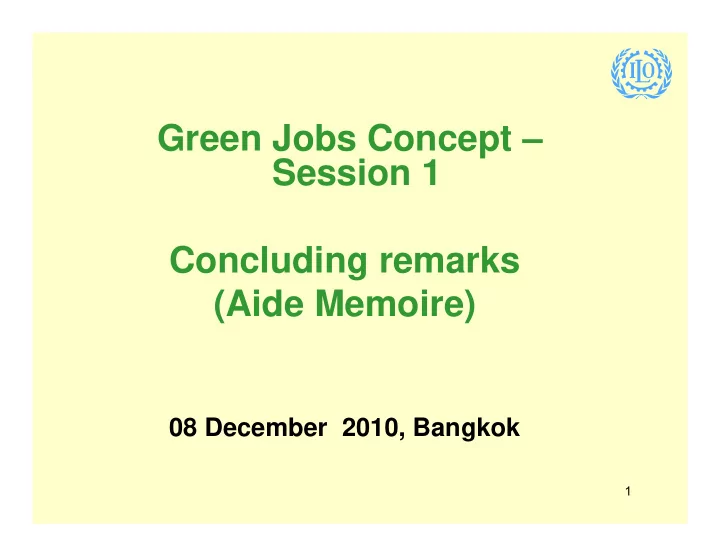

Green Jobs Concept – Session 1 Concluding remarks (Aide Memoire) 08 December 2010, Bangkok 1
1 - Green Jobs are Decent Work – Green Jobs are based on the two pillars of Decent Work and Environmentally Sustainability; – Green Jobs = Decent Work that contributes to Environmental Sustainability (ES) – Green Jobs are NOT dirty Jobs (in the green economy)
Ship- Ship -breaking breaking Ship Ship - - breaking breaking Over 100,000 workers in Asia, almost all untrained and unprotected in an environmentally damaging and hazardous industry. Not Green Jobs !! For decent work & environment related reasons Recycling Recycling Recycling Recycling Millions of workers in Asia involved in hazardous waste recycling (e-waste, lead and other heavy metals, etc.) in the informal sector.
3 – Decent Work Labor/social issues The core ILS (8) OHS standards others (ILC 2007 conclusions on sustainable enterprises ) Environment Engine of Growth
CORE INTERNATIONAL LABOR STANDARDS • Freedom of association and the effective recognition of the right to collective bargaining • C87 Freedom of Association and Protection of the Right to Organize Convention,1948; • C98 Right to Organize and Collective Bargaining Convention, 1949; • Elimination of all forms of forced or compulsory labor • C29 Forced Labour Convention 1930; • C105 Abolition of Forced Labour Convention, 1957 • Effective abolition of child labor • C138 Minimum Age Convention, 1973, • C182 Worst Forms of Child Labour Convention, 1999 • Elimination of discrimination in respect of employment and occupation • C100 Equal remuneration Convention, 1951, • C111 Discrimination (Employment and Occupation) Convention, 1958
Occupational health and safety standards & recommendations • Occupational Safety and Health Convention, 1981 (No. 155) and its Protocol of 2002 and Recommendation (No. 164); • Chemical Convention, 1990 (No. 170) and Recommendation (No. 177); • Prevention of Major Industrial Accident Convention, 1993 (No. 174) and Recommendation (No. 181); • Occupational Safety and Health Convention, 1985 (No. 161) and Recommendation (No. 171); • Promotional Framework for Occupational Safety and Health Convention, 2006 (No. 187) and Recommendation (No. 197); • ILO Guideline on Occupational Safety and Health Management Systems (ILO-OSH 2001)
2 – Environmental scope • CLIMATE CHANGE Greenhouse gases emissions reduction and capture Prevention of deforestation and forest degradation Adaptation to climate change and climate variability • BIODIVERSITY – DESERTIFICATION • ECO-SYSTEMS, LAND USE MANAGEMENT • POLLUTION CONTROL: air, water, waste, contaminated soils,etc.
3 . Measuring environmental performance Law enforcement agency/ Environmental Independent Legally binding Standards, Certification body Voluntary codes & guidelines Economic activity -Organic farmer -Green road construction -Sustainable tourism - Manufacturing, etc
Standards applicable to the Green Economy, Green Jobs Organic Agriculture - SNI 01-6729-2002 (Indonesian National Standards) on Organic Food System by National Standardization Agency of Indonesia Green Building and Construction - SNI 03-6759-2002 (Indonesian National Standards) on Codes for Energy conservation designation of buildings; Green Star (Australia) Green Finance Principles for Responsible Investment (UN- PRI) Sustainable Fisheries Marine Stewardship Council Fishery Standards Sustainable Forestry Forest Stewardship Council (FSC) Manufacturing and Industry (ISO) 14064 of Greenhouse Gas Accounting and Verification Tourism Green Globe 21 Standard
4 – A multi-dimentional, dynamic, concept • A Green Job in country A is not necessarily a Green Job in country B • In country A, a green job today, will not be a green job tomorrow • Use of the rule of law, voluntary mechanisms
5. The environment - economy linkages A cross-walk from environmentally friendly activities to green jobs energy supply, energy demand, prevention of Mitigation - GHGs reduction and emissions from biological sources, biological capture carbon sink services, etc; Ecosystem management, conservation, Biodiversity conservation, EDUCATION, sustainable agriculture, sustainable forestry, natural resource Mgt TRAINING, sustainable natural resource management, etc. RESEARCH, Adaptation to desertification, land use planning Desertification prevention MONITORING & CONTROL, In-land water services, water harvesting, Water PLANNING, sustainable agriculture, water efficiency (building). ADVOCACY AND Pollution control environmental goods and service industry (OECD, ACTIVISM, 1999): air pollution control, waste management, Air emissions prevention FINANCIAL & waste water management, monitoring and Waste water INSURANCE auditing, etc; Waste, soil decontamination SERVICES, Adaptation to climate variablity Climate related disaster management (preventive, etc, reactive action related services) Adaptation to climate change Agricultural services, health related services, natural resource management services, etc Environmental services, eco-tourism, etc; Eco-system services
Recommend
More recommend